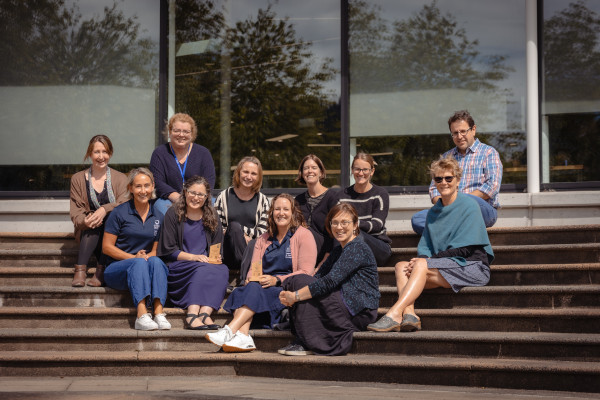- Tūhono home Hoki ki Tūhono
-
- Staff Directory
- Chief Executive Office Auckland International Office Corporate Services Finance Campus Services Functions and Catering Information Systems and Support Marketing, Communications and Engagement Learner Journey Academic Registry International Learner Services Te Punaka Ōwheo
- Learner Experience Academic Excellence Central Campus College of Community Development and Personal Wellbeing College of Engineering, Construction and Living Sciences College of Health College of Work Based Learning Open Education Resource/OERu Research and Postgraduate Studies Te Maru Pumanawa | College of Creative Practice and Enterprise
- Māori Development and Kaitohutohu Office People, Culture & Safety People and Culture Childcare Centre Te Ama Ako | Learning and Teaching Development Wellbeing and Safety Auckland Staff Directory Executive Office Academic Corporate Services Marketing and Business Development Human Resources Campus Quality and Programme Development
-
 Our people make a better world
Our people make a better world
We build the capabilities of individuals, organisations and communities and help them to realise their potential.
Staff Directory
-
- Tools
- Academic Integrity Declaration Form AIC applications dashboard Approved programmes Approved programme fees Centralised assessement repository Chemwatch Course evaluation and surveys CRM applications CRM customer service hub Delegations policy/process Disability and neurodiversity Dynamics 365 (CRM) EBS Ontrack EBS Report Email security personal portal Employment Matters / Solarworkplace / Performance reviews eTaxi eTV
- Financial variance reporting Hidden Disabilities Sunflower programme FCM travel intranet InPlace International entry requirements Knowledgebase articles Learner support dashboards Linkedin Learning Log a job with Marketing Login as an applicant Media consent form Microsoft 365 Moderation App Moodle OP Docs OP Docs - Publishing OP Image Libraries Performance Excellence Portal Pocket Lab (student healthcare) Product Evaluation Panel
- Policy Library Privacy Programme and course design/development Qualtrics XM RDS Remote access support portal Research Database Robertson Library Staff FAQs about graduation Status of Programmes Student intranet (Kāpehu) Study Abroad info for learners Taha Talks (videos for students) Tūhauora I Wellbeing resources Uniprint Vault Webexpenses Auckland tools
-
 Vault
Had an accident or near miss?
Log it here
Vault
Had an accident or near miss?
Log it here
-
- Communities
- Community AI Steering Committee Ally Network EBS Community of Interest EdTech Champions Health & Wellbeing Research Internal Evaluation Neurodiversity Professional Team Professoriate Proud@OP Student Support Website Advisory Group Web Champions Working under the Rainbow Project Learner Capability Trade Training Centre
- Committee Academic Committee Animals@OP Diversity and Equity Doctor of Professional Practice Committee Kaunihera Whakahaere - Leadership Council Internal Evaluation Learning & Teaching Leadership Team Library Committee Mental Health and Wellbeing Advisory Group Otago Polytechnic Board of Directors Pastoral Care Code Committee Programme Approvals Committee Research and Postgraduate Committee Research Ethics Committee Staff Subcommittee
- Think Tanks Mātauraka Our learners achieve educational success Pūtea Our financial success Tākata Our people, our team, our community Tiriti Our active commitment as a Treaty partner Tūroa Our commitment to be a sustainable and responsive organisation
-
 Create a community
Create a community
Do you have a community, committee or project that you'd like represented here?
Communities
-
- About OP
- Keep up to date All news All events All notices All blogs Share your info Create a news article Create an event Create a notice Create a blog
- Community and Partnerships Alumni and friends Education Foundation Operational information Academic calendar 2025 Academic calendar 2026 Current vacancies Dunedin campus map Our policies Topical FAQs
- Who we are About OP Commemorative sites Māori Strategic Framework OP merchandise Our history Our strategic priorities Pasifika Action Plan Pasifika Strategic Framework (2025-2030) Vision and Values Working for us OP job opportunities Wellbeing Calendar Working at OP
-
New Zealand: 0800 762 786
contact us
International: +64 3 477 3014
The Taieri Blokes' Shed: An ethnographic study
Author: James Sunderland
Supervisors: Linda Wilson Mary Butler
The Taieri Blokes Shed: An Ethnographic Study
James Sunderland
29 November 2013
Abstract
The Men’s Shed movement originated in Australia as a way of addressing older men’s health issues through engagement in meaningful activity. Sheds are embedded in a culture of ‘mateship’ where members work shoulder to shoulder on constructive work projects for the benefit of the wider local community, their Shed, and themselves. Research on Men’s Sheds indicates a number of benefits related to health, wellbeing, education, and vocational training. Most research to date has been based in an Australia context with minimal study conducted in New Zealand where there are now over thirty five active sheds. Although all Men’s Sheds share a focus on collective constructive work each individual Shed has a unique identity.
The aim of this study was to understand and interpret the culture of one New Zealand Men’s Shed community as viewed through an occupational lens. The Taieri Blokes Shed, situated in Otago New Zealand, was the chosen community for this research. An ethnographic methodology was used where I was a participant observer over a six month period, after which qualitative theme checking interviews were conducted with six chosen Shed members. Cultural records and secondary sources were also used to inform findings.
The findings revealed that meaningful constructive work is the foundation for attracting membership and providing benefits to individuals. Work needs to serve a purpose, be of benefit to the wider community, the individual member, and the Shed. Supporting occupational roles and the construction of place are requirements to enable constructive work and community. Identified benefits of membership include social inclusion and social contribution alongside structured work roles and social activities. Members value self-governance and the ability to exert control in the Shed community. Sheds need to sustain relationships with local communities and understand involvement in a national Men’s Shed context. Researchers and funders need to acknowledge, understand, and value the real work that is done in Men’s Sheds. Benefits or proposed interventions are dependent on the maintenance of true work and control remaining with Shed communities.
Implications and guidelines for the Taieri Blokes Shed, the Men’s Shed movement, and occupational therapy are outlined. Limitations of this study and suggested future research are offered.
James's research was supervised by Linda Wilson and Mary Butler.
Licence
This item is available under Creative Commons Attribution licence CC BY 4.0 International.